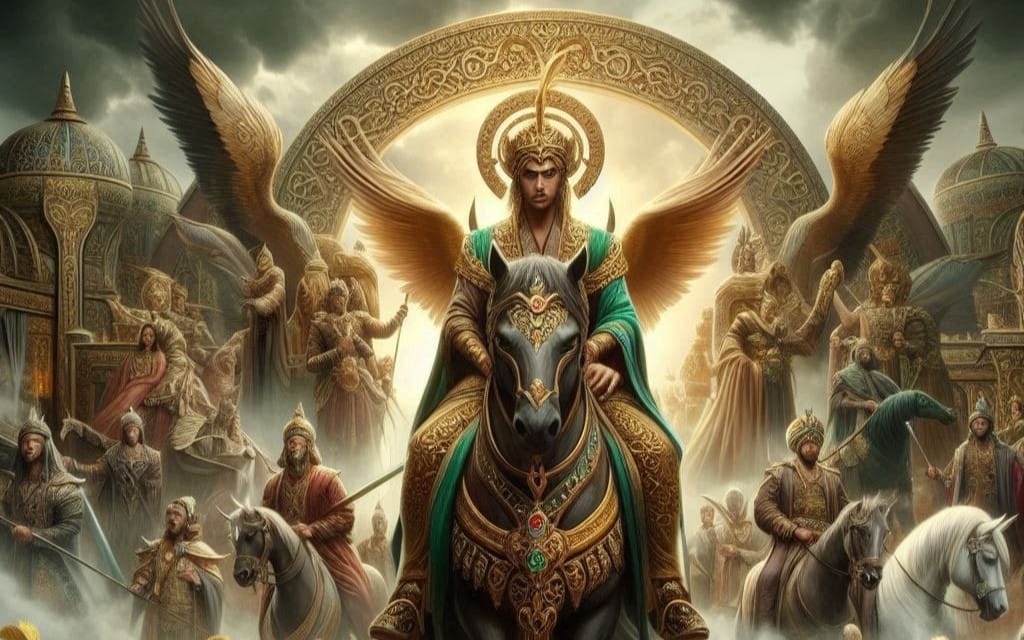Kudus Fatihi Selahaddin Eyyubi Drama Review: is an enthralling historical drama that brings to the screen the legendary tale of Saladin, one of the most esteemed figures in both Islamic and world history. This series skillfully blends historical fidelity with engaging storytelling, immersing viewers in the complex and vibrant world of the medieval Middle East. The narrative weaves through Saladin’s remarkable journey, from his formative years to his crucial role in the Crusades, shedding light on his enduring legacy through rich character portrayals and a compelling plot.
Historical Context of Saladin’s Life and Significance
Saladin, or Ṣalāḥ ad-Dīn Yūsuf ibn Ayyūb, born in 1137, rose to prominence during a volatile era characterized by the conflict between Islamic and Christian realms. Growing up in Mesopotamia, a region known for its cultural diversity and intellectual vibrancy, Saladin was steeped in the nuances of politics, military strategy, and Islamic scholarship.
His ascent to power was marked by his extraordinary leadership and strategic brilliance. As a military commander, Saladin succeeded in uniting the divided Muslim territories, forming a powerful coalition capable of challenging the Crusader states established by European invaders. His most significant accomplishment was the recapture of Jerusalem in 1187, a pivotal event that reshaped the Crusades and cemented his status as an exemplar of chivalry and justice.
Beyond his military achievements, Saladin was celebrated for his chivalrous demeanor, even towards his adversaries. His humane treatment of captives and efforts to reduce bloodshed earned him respect from both Muslim and Christian contemporaries. Saladin’s enduring legacy as a unifier and protector of Islam has remained a powerful symbol of resilience and integrity.
“Kudüs Fatihi Selahaddin Eyyubi” not only dramatizes the life of this extraordinary leader but also offers a glimpse into the rich cultural and political milieu of the medieval Islamic world. By vividly portraying Saladin’s life, the series provides viewers with a profound understanding of the historical forces that shaped his actions and the lasting impact of his legacy.

Plot Summary
Kudüs Fatihi Selahaddin Eyyubi chronicles the life and legacy of Saladin, tracing his path from a young noble in Mesopotamia to a revered historical figure. Set against the turbulent backdrop of the Crusades, the series highlights the intense struggles and defining moments of his illustrious career.
Main Storyline and Key Events
The series opens with Saladin’s early years, depicting his upbringing in a noble Kurdish family and his education under his uncle Shirkuh, a notable military commander. As Saladin matures, he is portrayed as a gifted strategist and charismatic leader, gradually gaining recognition for his abilities.
Saladin’s rise to power unfolds through significant events, including his service under the Zengid dynasty and his eventual appointment as the vizier of Egypt. His political acumen and military prowess lead to the unification of Muslim territories, paving the way for his ultimate ambition: the recapture of Jerusalem.
The core of the series focuses on Saladin’s campaigns against the Crusader states. It vividly illustrates the Battle of Hattin in 1187, where Saladin’s forces achieve a decisive victory over the Crusaders, resulting in the fall of Jerusalem. This pivotal moment is depicted with dramatic intensity, emphasizing Saladin’s strategic genius and humanitarian leadership.
The series also delves into Saladin’s interactions with prominent figures of his time, such as Richard the Lionheart, King of England, during the Third Crusade. Their complex relationship, characterized by mutual respect and rivalry, adds depth to the narrative, showcasing Saladin’s chivalry and diplomacy.
Major Historical Moments Depicted
- Saladin’s Early Life and Rise to Power: The series explores Saladin’s formative years, his training under Shirkuh, and his ascent to power as the vizier of Egypt.
- Battle of Hattin (1187): This crucial military engagement, where Saladin’s forces decisively defeat the Crusaders, leading to the capture of Jerusalem, is portrayed with historical accuracy.
- Recapture of Jerusalem (1187): The dramatic retaking of Jerusalem is shown, highlighting Saladin’s merciful treatment of the city’s inhabitants.
- Third Crusade (1189-1192): Key events of the Third Crusade, including the sieges of Acre and Jaffa and the diplomacy between Saladin and Richard the Lionheart, are depicted.
- Treaty of Ramla (1192): The series concludes with the signing of the Treaty of Ramla, ending hostilities between Muslim and Crusader forces, allowing Christian pilgrims access to Jerusalem while maintaining Muslim control.
Through these historical moments, Kudüs Fatihi Selahaddin Eyyubi offers a captivating and nuanced portrayal of Saladin’s life, his military campaigns, and his lasting legacy as a unifier and defender of the Islamic world.
Character Analysis
Saladin (Ṣalāḥ ad-Dīn Yūsuf ibn Ayyūb)
In Kudüs Fatihi Selahaddin Eyyubi, Saladin is portrayed with depth and complexity, capturing the essence of a leader who embodies both military skill and profound compassion. From his early years, he is depicted as a young man of exceptional intellect and determination, profoundly influenced by his uncle Shirkuh and the cultural richness of the Islamic Golden Age. As he matures, his strategic brilliance and visionary leadership become evident, enabling him to unite the fragmented Muslim territories against the Crusader states.
Saladin’s character is defined by a strong sense of duty and morality. His approach to warfare emphasizes not just conquest but also the minimization of unnecessary bloodshed and the respectful treatment of enemies. This is illustrated in his humane treatment of captives after the Battle of Hattin and the generous terms he offered to the inhabitants of Jerusalem upon its recapture. The series highlights his diplomatic skills, particularly in his interactions with Richard the Lionheart during the Third Crusade, showcasing a leader who valued peace and negotiation as much as military victory.
Other Significant Characters and Their Roles
Richard the Lionheart
Richard the Lionheart, the King of England, serves as Saladin’s primary adversary during the Third Crusade. The series explores the complexity of their relationship, marked by fierce rivalry and mutual respect. Richard is portrayed as brave, determined, and chivalrous, often reflecting Saladin’s qualities. Their interactions, from battlefield confrontations to diplomatic negotiations, are central to the narrative, illustrating the high-stakes chess game of medieval warfare and diplomacy.
Shirkuh
Shirkuh, Saladin’s uncle and mentor, is pivotal in shaping Saladin’s early military career. As a seasoned general and strategist, Shirkuh’s teachings and guidance are crucial in Saladin’s rise to power. His character acts as a catalyst for Saladin’s transformation from a young noble to a formidable leader, emphasizing the importance of mentorship and legacy in the medieval Islamic world.
Al-Adil (Saif ad-Din)
Al-Adil, Saladin’s brother, serves as a key advisor and supporter throughout his campaigns. He embodies loyalty, wisdom, and strategic insight, often acting as a stabilizing force within Saladin’s court. Al-Adil’s role underscores the importance of family and trusted allies in Saladin’s administration, highlighting the collaborative nature of his leadership.
Raynald of Châtillon
Raynald of Châtillon, a notorious Crusader knight, is one of the primary antagonists in the series. His ruthless tactics and provocations, such as attacking Muslim caravans, serve as catalysts for Saladin’s military campaigns against the Crusader states. Raynald’s character sharply contrasts with Saladin’s, emphasizing Saladin’s chivalry and sense of justice.
Queen Sibylla
Queen Sibylla of Jerusalem is portrayed as a complex and multifaceted character, navigating the turbulent political landscape of the Crusader states. Her character adds depth to the narrative, representing the internal struggles and conflicting loyalties within the Crusader camp. Sibylla’s interactions with Saladin highlight the broader implications of the Crusades on both Christian and Muslim societies.
Conclusion
Kudüs Fatihi Selahaddin Eyyubi offers a rich and detailed exploration of its characters, bringing historical figures to life with depth and authenticity. Saladin’s portrayal stands as a testament to his enduring legacy as a just and compassionate leader, while the supporting characters provide a well-rounded perspective on the complex and dynamic world of the Crusades. Through its character-driven narrative, the series not only entertains but also educates viewers about the pivotal events and personalities that shaped this critical period in history.

Acting and Performances
Main Cast Performances
Saladin (Ṣalāḥ ad-Dīn Yūsuf ibn Ayyūb) – Lead Actor
The actor portraying Saladin delivers a compelling and multifaceted performance, capturing the essence of a leader known for his strategic brilliance and deep sense of justice. His portrayal of Saladin’s internal struggles, moments of introspection, and unwavering determination adds depth to the character. Through subtle facial expressions and commanding presence, the actor brings Saladin’s legendary compassion and chivalry to life, making the historical figure relatable and inspiring to the audience.
Richard the Lionheart – Supporting Actor
The actor playing Richard the Lionheart shines in his portrayal of the formidable and charismatic King of England. His dynamic performance showcases Richard’s bravery, strategic mind, and complex relationship with Saladin. The chemistry between Richard and Saladin is palpable, marked by mutual respect and intense rivalry. The actor’s powerful depiction of Richard adds layers to this historical figure, highlighting both his strengths and vulnerabilities.
Shirkuh – Supporting Actor
Shirkuh’s character is brought to life by an actor who embodies the role of a seasoned military strategist and mentor. His portrayal is both authoritative and nurturing, effectively conveying the critical influence Shirkuh had on Saladin’s early career. The actor’s performance provides a strong foundation for Saladin’s character development, emphasizing the themes of mentorship and legacy.
Al-Adil (Saif ad-Din) – Supporting Actor
The actor playing Al-Adil delivers a performance that exudes wisdom, loyalty, and strategic acumen. As Saladin’s brother and close advisor, Al-Adil’s character serves as a stabilizing force, and the actor skillfully portrays this role with a quiet strength and deep sense of duty. His interactions with Saladin highlight the collaborative and familial aspects of Saladin’s leadership.
Raynald of Châtillon – Supporting Actor
Raynald of Châtillon’s actor brings a menacing intensity to the role, effectively portraying the ruthless and provocative nature of this Crusader knight. His performance underscores the antagonistic forces that Saladin faced, creating a stark contrast with Saladin’s chivalrous character. The actor’s ability to evoke strong emotions in the audience contributes significantly to the dramatic tension of the series.
Queen Sibylla – Supporting Actress
Queen Sibylla’s character is portrayed with complexity and depth by a talented actress who captures the nuances of her political and personal struggles. Her performance highlights the internal conflicts within the Crusader states and adds a layer of intrigue to the narrative. The actress’s ability to convey Sibylla’s strength, vulnerability, and resilience enriches the overall storytelling.
Noteworthy Supporting Actors and Their Contributions
Imad ad-Din al-Isfahani
The actor playing Imad ad-Din al-Isfahani, Saladin’s trusted chronicler and advisor, delivers a performance that highlights the intellectual and cultural dimensions of Saladin’s court. His character serves as a bridge between the historical events and the audience, providing insights and context that enhance the narrative.
Balian of Ibelin
The portrayal of Balian of Ibelin by a skilled actor adds another layer of complexity to the series. His character, known for defending Jerusalem, is depicted with a sense of honor and pragmatism. The actor’s performance brings out the internal dilemmas faced by the Crusader leaders, adding depth to the depiction of the opposing forces.
Ibn Shaddad
The actor playing Ibn Shaddad, Saladin’s loyal companion and advisor, delivers a performance that emphasizes loyalty and wisdom. His character provides a moral compass within Saladin’s inner circle, and the actor’s portrayal adds a sense of continuity and stability to the series.
Kudus Fatihi Selahaddin Eyyubi Drama Review
- Ugur Gunes as Saladin, also known as Salah ad-Din Yusuf bin Ayyub bin Shadi. Saladin establishes the Ayyubid dynasty and becomes the first ruler of Egypt and Syria in the TV series.
- Mehmet Ali Nuroğlu as Nur ad-Din Zengi, a renowned Muslim ruler and military commander, is depicted as leading the Zengid dynasty during the Crusader period in the TV series. He and Saladin will be portrayed as serving as commanders under the Zengid dynasty, although not closely related. Nur ad-Din will be depicted as ruling over parts of Iraq, Syria, and Egypt, and holds the title of Emir of Aleppo and Damascus.
- Seda Yıldız as Ayyub ibn Shadi, a soldier and politician from Dvin and the father of Selahaddin Eyyubi.
- Zeynep Kumral as Fatma Hatun, the wife of Ayyub ibn Shadi and mother of Selahaddin.
- Burak Sarimola as Shehinshah, the oldest son of Ayyub ibn Shadi and brother of Selahaddin.
- Ali Ersan Duru as Turan-Shah, an elder brother of Saladin.
- Sezgin Erdemir as Asad ad-Din Shirkuh, the brother of Ayyub ibn Shadi and uncle of Saladin.
- Dilin Döğer as Süreyya Khatun, will play a key role in defending the Muslim lands and establishing the Ayyubid dynasty in the TV series.
- Sezin Akbaşoğulları as Ismat ad-Din Khatun was the daughter of a regent of Damascus.
- Barış Bağcı as Rashid ad-Din Sinan.
- Noor ul Hassan as Abdul Qadir Gilani.
Cultural and Religious Representation
Depiction of Islamic Culture and Values
Kudüs Fatihi Selahaddin Eyyubi offers a rich and respectful portrayal of Islamic culture and values, focusing on themes of justice, compassion, and unity. The series emphasizes Saladin’s adherence to Islamic principles, such as his fair treatment of captives, his commitment to mercy, and his efforts to minimize bloodshed. It also showcases the vibrant intellectual and cultural life of the Islamic world during the medieval period, featuring scenes of scholarly discussions, architectural marvels, and flourishing arts. The depiction of Saladin’s court and daily life reflects the deep-rooted values of hospitality, loyalty, and devotion to God, offering viewers a nuanced and respectful depiction of Islamic civilization.
Representation of Different Religious Groups and Their Interactions
The series thoughtfully represents the diverse religious landscape of the time, depicting interactions between Muslims, Christians, and Jews with sensitivity and depth. It portrays the complexities of the Crusades, highlighting both the conflicts and the moments of mutual respect and cooperation. Characters such as Richard the Lionheart and Queen Sibylla are depicted with their own cultural and religious nuances, fostering a balanced perspective. The series underscores the chivalric code followed by both Muslim and Christian knights, illustrating shared values of honor and bravery.
By presenting the coexistence and clashes between different religious communities, Kudüs Fatihi Selahaddin Eyyubi fosters a deeper understanding of the historical context, promoting a message of respect and empathy across cultural and religious divides. The show’s commitment to authentic representation helps bridge historical and cultural gaps, encouraging viewers to appreciate the rich tapestry of human history and the enduring values that connect us all.
Conclusion
Kudüs Fatihi Selahaddin Eyyubi excels in portraying the rich cultural and religious tapestry of the medieval Islamic world, while also highlighting the complex interactions between different religious communities during the Crusades. Through its respectful and nuanced depiction of Islamic values and the diverse religious landscape of the time, the series not only entertains but also educates viewers about the enduring principles of justice, compassion, and unity. It promotes a message of respect and empathy, encouraging a deeper appreciation of the shared human values that transcend cultural and religious differences.


